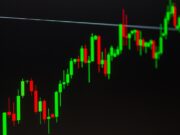The right stocks can make you rich and change your life.
The wrong stocks, though… They can do a whole lot more than just “underperform.” If only! They can eviscerate your wealth, bleeding out your hard-won profits.
They’re pure portfolio poison.
Surprisingly, not many investors want to talk about this. You certainly don’t hear about the danger in the mainstream media – until it’s too late.
That’s not to suggest they’re obscure companies – some of the “toxic stocks” I’m going to name for you are in fact regularly in the headlines for other reasons, often in glowing terms.
I’m going to run down the list and give you the chance to learn the names of three companies I think everyone should own instead.
But first, if you own any of these “toxic stocks,” sell them today…
Quantum Computing (QUBT): A Stock to Avoid Amid the Hype
Quantum Computing (QUBT) has captured investor attention with its meteoric rise—up about 2,400% in just three months—fueled by growing excitement around artificial intelligence (AI) and quantum computing. But beneath the buzz lies a company with a questionable history, limited revenue, and a valuation that raises more red flags than confidence. Here’s why investors might want to steer clear of this speculative play.
Quantum Computing, the company, has undergone several pivots since its founding in 2001, starting as a seller of inkjet cartridges, shifting to beverages, and now claiming a place in the quantum computing space. This pattern of reinvention, coupled with past business failures and legal troubles, raises concerns about the company’s long-term strategy and credibility. Its recent rebranding to Quantum Computing feels reminiscent of gimmicky moves like Long Island Iced Tea’s infamous pivot to blockchain—a rebrand that capitalized on hype without substantial business fundamentals.
Even if we set aside its murky history, Quantum Computing’s financials tell a concerning story. The company generated only $386,000 in trailing 12-month revenue, giving it a staggering price-to-sales ratio of about 5,400. For comparison, even some of the most well-established, high-growth tech stocks rarely sustain P/S multiples above 50. With minimal revenue and significant costs associated with developing quantum computing systems, the company is likely to continue burning cash for the foreseeable future.
To fund its operations, Quantum Computing has already raised $14.6 million through secondary offerings in the first three quarters of 2024. With its stock price surging, management may be tempted to raise more capital through additional offerings, diluting existing shareholders and potentially putting downward pressure on the stock.
The speculative nature of this company, combined with its outsized valuation and history of pivots, makes it a risky bet. While quantum computing has vast potential, investors should look for more established players in the field rather than chasing a company with minimal revenue and questionable fundamentals. For those considering QUBT, the risks far outweigh the rewards at this point.
Viking Therapeutics (VKTX): A Sell in the Face of Heightened Competition
Viking Therapeutics has had a standout year in biotech, thanks to impressive mid-stage results for its weight loss candidate VK2735. The stock has seen significant gains, though it has recently pulled back sharply, dropping more than 10% in one session and 24% over the past month. The cause? Mounting competition in the weight loss drug market—specifically from industry heavyweight Merck.
Merck’s recent announcement of a $112 million licensing deal with Hansoh Pharma to develop an oral GLP-1 weight loss candidate signals the company’s serious intent to enter this lucrative market. While Merck’s candidate, HS-10535, is still in pre-clinical testing, the mere prospect of such a formidable competitor has rattled Viking’s shareholders.
Although Viking’s VK2735 remains ahead in clinical development, its dominance is now uncertain as more established players with deeper resources, like Merck, move into the space. This competition increases the risk for investors at a time when the weight loss market is already heating up with high-profile drugs from Eli Lilly and Novo Nordisk.
The company’s other programs, including VK2809 for liver disease, have shown promise, but the long timelines, costly clinical trials, and the potential for setbacks create additional uncertainty.
While Viking Therapeutics has shown strong innovation and potential, the recent selloff underscores the risks of investing in a mid-cap biotech facing intensifying competition. For investors seeking stability or less speculative growth, Viking Therapeutics may be a stock to avoid for now.
Lucid Motors (NASDAQ: LCID) A Risky Bet in a Competitive EV Market
Lucid Motors continues to draw comparisons to Tesla, but the gap between the two companies remains vast. While Lucid has made strides in producing and delivering vehicles—reporting a 90% year-over-year improvement in Q3 deliveries—it still lags far behind Tesla’s scale. To put it in perspective, Tesla delivered 462,890 vehicles in the same period, compared to Lucid’s 2,781.
This stark disparity underscores Lucid’s uphill battle to compete in an increasingly crowded EV market. While Tesla faced little competition during its early days, Lucid must contend with both established automakers and new entrants vying for market share. Building its business requires massive capital investments, and Lucid is still deep in the red. The company reported a Q3 2024 loss of $0.41 per share, widening from a $0.28 loss a year ago.
Management has emphasized its liquidity of $5.16 billion, but this cash reserve is not infinite. The company faces significant pressure to scale production and move toward profitability before those funds run dry. With stiff competition and a challenging road ahead, Lucid remains a speculative bet rather than a stable investment.
Unless you’re prepared to take on high levels of risk in the hopes of a long-term turnaround, Lucid Motors is a stock to avoid for now. Watch the story unfold from the sidelines rather than betting on a recovery that’s far from guaranteed.






